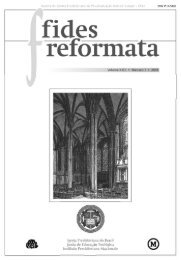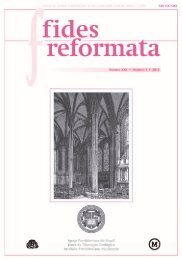Fides 22 N2
Um publicação do Centro Presbiteriano de Pós-graduação Andrew Jumper.
Um publicação do Centro Presbiteriano de Pós-graduação Andrew Jumper.
You also want an ePaper? Increase the reach of your titles
YUMPU automatically turns print PDFs into web optimized ePapers that Google loves.
FIDES REFORMATA XXII, Nº 2 (2017): 139-162<br />
Very closely related to the “apostolate” subject is the case of Adrianus<br />
Saravia, which has been used out of proportion as an argument against the<br />
reformers in general. George Robson, the editor of Warneck’s history, made a<br />
relevant observation regarding this matter.<br />
What ought to be noticed is that neither Erasmus nor Saravia, to whom Dr. Warneck<br />
afterwards refers, saw the missionary duty of the church in such a light as<br />
to make it matter of a special treatise or of a distinct call to action. Their views<br />
on missions were expressed incidentally, by the one in a treatise dealing with<br />
homiletics, by the other in a treatise dealing with Church polity. 23<br />
Most of those critiques referred not to the reformers’ interpretation of the<br />
biblical passages, but the application of such passages to “missions.” But to<br />
conclude that someone does not apply a passage in a particular way does not<br />
mean that the scholar is purposely opposing other applications of the passage.<br />
When Calvin, for instance, deals with the so-called Great Commission texts,<br />
his concerns have to do with the controversies of his time and “so the words of<br />
our Lord are shown to be in clear and broad antagonism to certain Romish and<br />
Anabaptist teachings.” 24 This does not mean that Calvin was purposely silent<br />
and opposed to the evangelization of the world. Without exegeting Calvin more<br />
carefully in his context, Warneck simply concluded that his apparent silence<br />
meant opposition to the spread of the gospel to the whole world. Unfortunately,<br />
Warneck did not explore all of Calvin’s theology of the sovereignty of God, nor<br />
any other numerous texts in which he explicitly teaches about the preaching<br />
of the gospel to the whole world.<br />
A superficial look at John Knox and his ministry in Scotland during the<br />
sixteenth century may suggest that Knox did not care for the spreading of<br />
the gospel in other lands. Besides his declaration to Queen Mary against the<br />
Roman Catholic Church, the other most quoted and publicized words of John<br />
Knox are “Give me Scotland or I die.” What is overlooked is that Knox and his<br />
colleagues were very concerned with the evangelization of the world, in spite<br />
23 See footnote 1, page 9, of Warneck’s Outline of a History. Adrianus Saravia was not criticizing<br />
the reformers. The title of Chapter XVII of Saravia’s book is this: “The command to preach the gospel<br />
to all nations is still binding on the church, although the apostles are removed to heaven: and apostolic<br />
authority is necessary thereto” (1840, 161). When carefully read, we immediately realize that he follows<br />
the same exegetical principle of John Calvin when dealing with Matthew 28:20. Saravia writes: “The<br />
command to preach the Gospel and the mission to all nations were so given to the Apostles, that they<br />
must be understood to be binding on the Church also. The injunction to preach the Gospel to all nations<br />
of unbelievers had respect not only to the age of the Apostles, but to all ages to come till the end of<br />
the world” (161). Saravia’s 276-page tract appeared in 1590 and was first printed in England in 1591.<br />
On July 9, 1590, Saravia was “incorporated at Oxford being before D.D. of the University of Leyden”<br />
(Preface of the translator, v). This treatise was about ecclesiastical polity or church government. Saravia<br />
was not criticizing the reformers regarding the subject of missions.<br />
24 See George Robson, footnote 1, page 20, in Warneck’s Outline of a History.<br />
145




